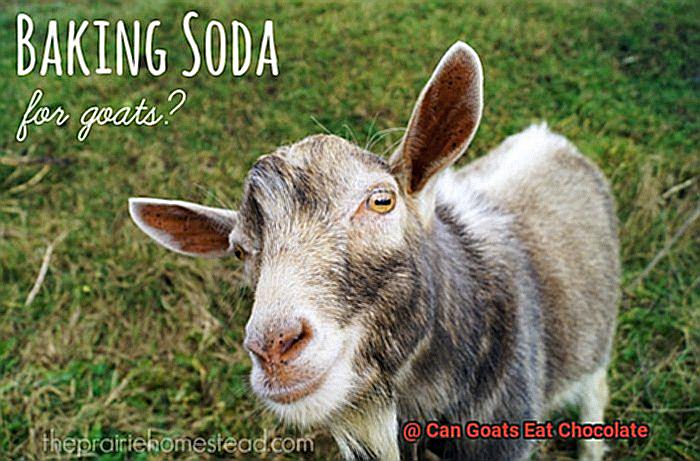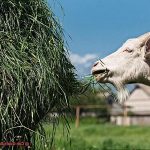Chocolate is a beloved treat that many of us enjoy indulging in. From gooey brownies to creamy hot cocoa, chocolate has a way of satisfying our sweet tooth cravings. However, when it comes to our furry friends, chocolate can be extremely dangerous – especially for dogs. But what about goats? Can these adorable creatures safely consume chocolate?
As a goat owner, you likely love spoiling your pet with tasty treats like apples, carrots, and grains. But before you offer them a piece of chocolate, it’s crucial to understand the potential risks involved. In this article, we’ll delve into the topic of whether goats can eat chocolate and why it’s not recommended.
We’ll explore the harmful effects that even small amounts of chocolate can have on your goat’s health and wellbeing. We’ll also debunk some common misconceptions about feeding goats chocolate and suggest alternative treats that are safer for them to enjoy.
Whether you’re an experienced goat owner or just starting out, it’s important to understand your pet’s dietary needs and preferences. That’s why we’ll provide you with some helpful tips to ensure your goat stays healthy and happy.
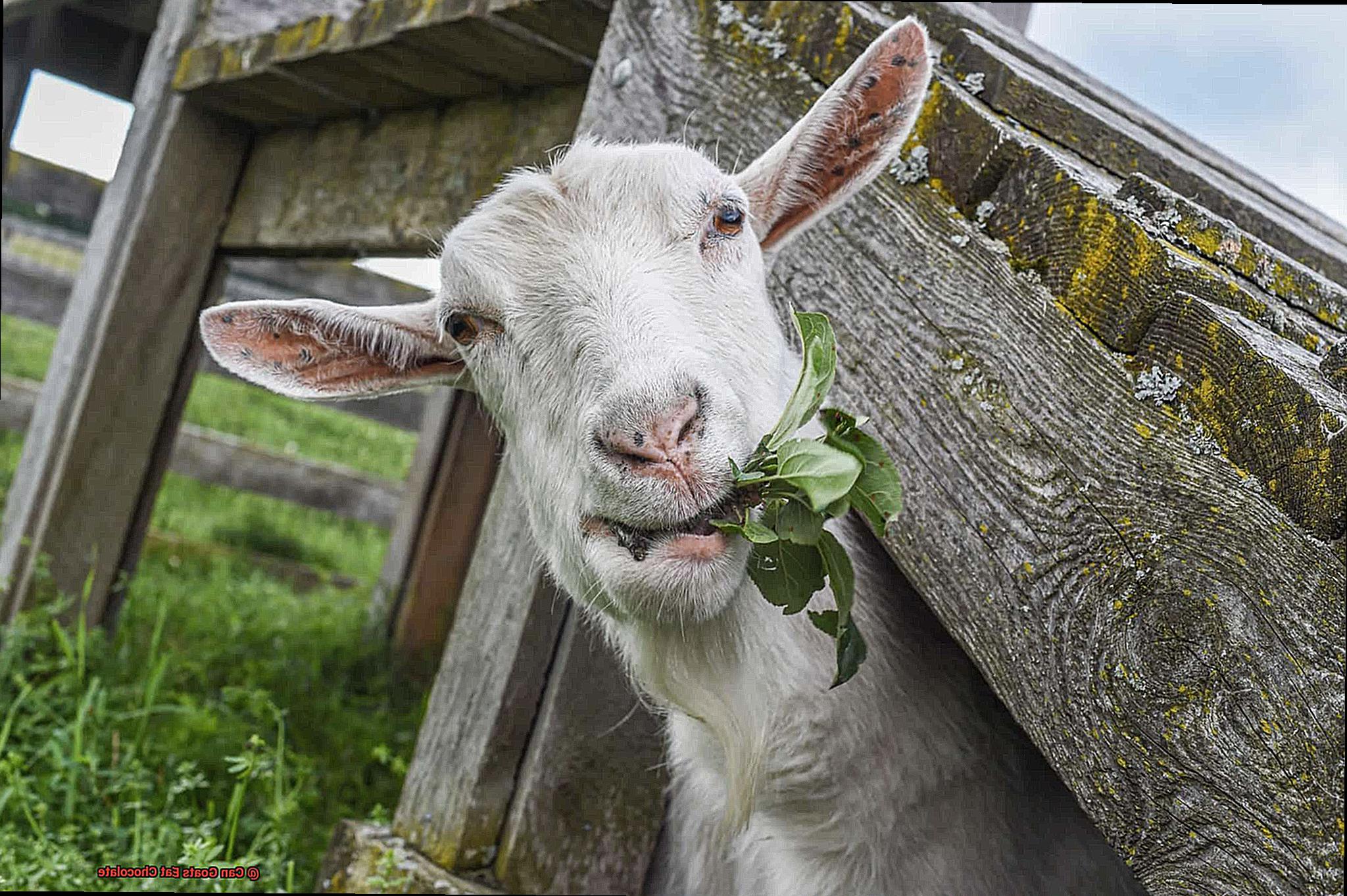
So if you’re curious about whether goats can eat chocolate or want to learn more about their diet, keep reading. This informative discussion is sure to shed light on this popular question among goat owners everywhere.
What is Chocolate?
Contents
Chocolate is a delectable indulgence that’s beloved by many people worldwide. But what exactly is chocolate, and how is it made? Chocolate is created from cocoa beans that undergo a process of milling, roasting, and grinding. This mixture is then blended with sugar and other ingredients to produce various chocolate treats.
There are several types of chocolate available, including milk chocolate, dark chocolate, and white chocolate. Milk chocolate typically contains about 10-12% cocoa solids, while dark chocolate has a higher percentage of cocoa solids (approximately 50-85%). White chocolate contains no cocoa solids at all and is instead made from cocoa butter, sugar, and milk solids.
Although goats are curious creatures, it’s best not to feed them any type of chocolate as they cannot tolerate theobromine, a chemical compound found in cocoa. Theobromine can be toxic to many animals, including dogs, cats, and horses. Symptoms can range from mild vomiting or diarrhea to tremors, seizures, and even death in severe cases.
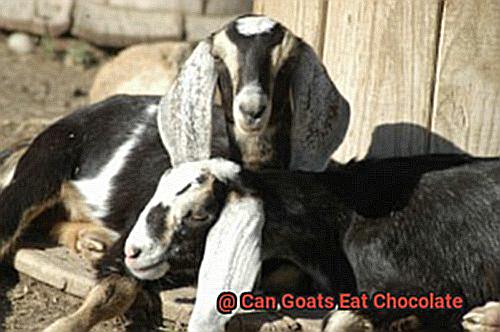
The severity of the symptoms depends on the amount of theobromine consumed and the size of the goat. Smaller goats are more susceptible to the effects of theobromine than larger goats. Moreover, dark chocolate contains higher levels of theobromine compared to milk chocolate, making it even more hazardous for goats to consume.
It’s crucial to prioritize our furry friends’ health and happiness by avoiding feeding them any type of chocolate. Instead, stick to a diet consisting of hay, fresh vegetables, and fruits that are safe for goats to eat. Remember that prevention is always better than cure when it comes to our pets’ well-being.
What is Theobromine and why is it Dangerous for Goats?
Specifically, I want to delve into a chemical compound found in chocolate called Theobromine and why it is perilous for goats.
Theobromine is a naturally occurring bitter-tasting substance found in cocoa beans, which are used to make chocolate. While humans can consume this compound in moderation, it can be fatal for goats. Theobromine belongs to a group of alkaloids known as methylxanthines, which are stimulants that affect the central nervous system.
When goats ingest even small amounts of theobromine, they can suffer from mild symptoms such as vomiting and diarrhea. However, if consumed in large quantities, it can lead to more severe symptoms such as seizures, muscle tremors, and even death. Unfortunately, goats cannot metabolize theobromine efficiently like humans can, causing it to accumulate in their system at a faster rate.
It is crucial to keep all chocolate products away from your goats to ensure their safety and well-being. Even traces of chocolate can be dangerous for goats, especially if they are already experiencing health problems or are on medication.
Different Types of Chocolate and their Effects on Goats
However, before you do, it’s important to understand the different types of chocolate and their effects on goats.
Milk chocolate is one of the most commonly consumed types of chocolate, but it should never be fed to goats. This type of chocolate contains high levels of sugar and fat that can cause digestive issues and even contribute to obesity in goats. We all know that goats love to nibble on anything they can get their hooves on, but it’s essential to resist the temptation to share your milk chocolate with them.
Dark chocolate is often praised for its health benefits in humans. However, when it comes to feeding goats, it is a big no-no. Dark chocolate contains caffeine and theobromine at higher levels than milk chocolate, making it extremely toxic to goats. These harmful substances can cause severe health problems like heart failure and seizures that can even lead to death. So, if you love your goats, avoid feeding them dark chocolate at all costs.
White chocolate may seem like a safer option since it does not contain caffeine or theobromine. Nevertheless, it is still not recommended for goats due to its high sugar and fat content. Feeding your goats white chocolate can lead to digestive issues and contribute to obesity as well.
In summary, no type of chocolate should be fed to goats as they can cause various health problems. As responsible goat owners, we must always prioritize our furry friends’ health by sticking to foods that are specifically formulated for them and avoiding anything that is not recommended by a veterinarian or animal nutritionist.
Remember, keeping our goats healthy and happy should always be our top priority. Feed them nutritious food, provide clean water, and give them plenty of love and attention.
Symptoms of Theobromine Poisoning in Goats
Theobromine, a compound found in chocolate, can be fatal to goats if ingested in large amounts. Ingesting chocolate can lead to severe health problems such as digestive issues, obesity, heart failure, and seizures that could even result in death.
Symptoms of theobromine poisoning in goats can differ depending on the amount of chocolate consumed and the goat’s sensitivity to the compound. Vomiting is a common symptom, along with diarrhea, abdominal pain, and restlessness. In severe cases, goats may also experience seizures, tremors or even heart failure.
It is important to note that the symptoms of theobromine poisoning in goats can be similar to other health issues. Therefore, it is crucial for goat owners to seek veterinary care if they suspect their goat has ingested chocolate or is exhibiting any unusual symptoms.
Preventing theobromine poisoning in goats is key. Goat owners should ensure that their goats do not have access to chocolate or any other food products containing theobromine. If a goat does accidentally consume chocolate, it is important to act quickly and seek veterinary care.
How to Prevent Goats from Eating Chocolate
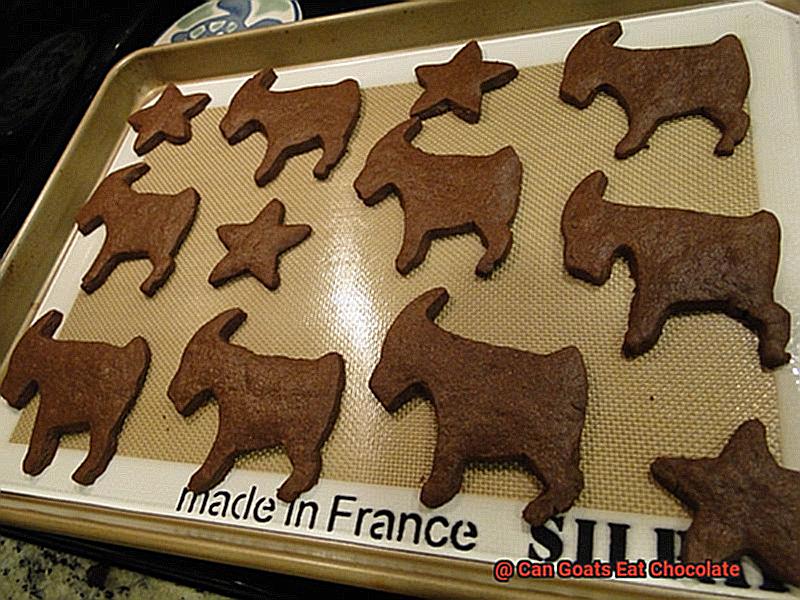
Goats are known for their curious and adventurous nature, but this curiosity can sometimes lead them to eat things that are harmful to their health. Chocolate, in particular, is highly toxic to goats and can cause severe health problems, including vomiting, diarrhea, and seizures. To prevent your goats from accessing chocolate, here are five steps you can take:
Keep Chocolate Out of Reach
Goats can be quite resourceful and may be able to reach chocolate stored in low or open containers. It’s best to store chocolate in an airtight container or a high location where goats cannot access it.
Educate Yourself and Others
Chocolate contains theobromine, which is toxic to goats in large quantities. Make sure that anyone who comes into contact with your goats knows that feeding them chocolate is strictly forbidden. This includes visitors, children, and other pets.
Provide a Nutritious Diet
A well-fed goat is less likely to be tempted by harmful foods like chocolate. Make sure that your goats have access to fresh water at all times and provide them with plenty of hay and grass to graze on.
Monitor Behavior for Signs of Chocolate Consumption
If you suspect that your goat has eaten any amount of chocolate, it’s essential to monitor their behavior for signs of chocolate poisoning. Restlessness, increased heart rate, and muscle tremors are all symptoms of chocolate poisoning in goats. If you notice any of these symptoms, contact your veterinarian immediately.
Fence off Areas Where Chocolate is Consumed or Stored
If you have a particularly curious goat, it may be necessary to fence off any areas where chocolate is being consumed or stored. This will prevent your goat from accidentally or intentionally consuming chocolate.
In conclusion, preventing goats from eating chocolate is crucial for their overall health and wellbeing.
Alternatives Foods that are Safe for Goats to Eat
While goats are known for their ability to eat just about anything, not all foods are safe for them. Some can even be deadly. So, what alternatives can we feed our goats that will keep them healthy and satisfied?
First on the list is hay. This staple food provides goats with the necessary fiber and nutrients they need to maintain their health. It’s an excellent source of roughage and helps keep their digestive system functioning properly.
Fresh fruits and vegetables are also safe for goats to eat. Apples, carrots, and leafy greens are among their favorites. These foods provide additional vitamins and minerals to your goat’s diet and keep them happy.
Grains like oats, barley, and corn are another option for goats. They provide an excellent source of energy and protein for our furry friends. However, it’s important to remember to feed grains in moderation.
Certain nuts like peanuts and almonds can be safely consumed by goats in moderation as well. Nuts provide a good source of protein and healthy fats.
Dairy products like yogurt and cheese can also be given to goats in small amounts. These products provide additional protein and calcium to your goat’s diet.
Herbs like rosemary and mint can also be beneficial for goats. Herbs provide additional nutrients and have medicinal properties that can help keep your goat healthy.
Lastly, there are many types of commercial goat feeds available that are specifically formulated to meet the nutritional needs of goats. These feeds can be a convenient way to ensure your goat is getting all the nutrients they need.
SYNIBqBUtFk” >
Conclusion
In conclusion, it’s a big no-no to feed goats chocolate. Theobromine, a toxic substance found in chocolate, can cause serious health issues and even death in goats. Depending on the amount of chocolate consumed and the size of the goat, symptoms can range from mild to severe. Dark chocolate has higher levels of theobromine compared to milk chocolate, making it particularly dangerous for our furry friends.
As responsible goat owners, we should always prioritize their health and wellbeing by avoiding feeding them any type of chocolate. Instead, we should provide them with a balanced diet consisting of hay, fresh vegetables, fruits, and commercial goat feeds that are safe for them to consume.
Preventing goats from accessing chocolate is crucial for their overall health. It’s essential to keep all chocolate products out of reach and educate others about the dangers of feeding goats chocolate.
Fortunately, there are plenty of alternative foods that are safe for goats to eat. These include hay, fresh fruits and vegetables, grains in moderation, certain nuts in moderation, dairy products in small amounts, herbs like rosemary and mint, and commercial goat feeds.
Remember that prevention is key when it comes to our pets’ well-being. By prioritizing their dietary needs and preferences and providing them with a healthy diet, clean water, love, attention, and veterinary care when needed; we can ensure that our beloved goats stay healthy and happy for years to come.

